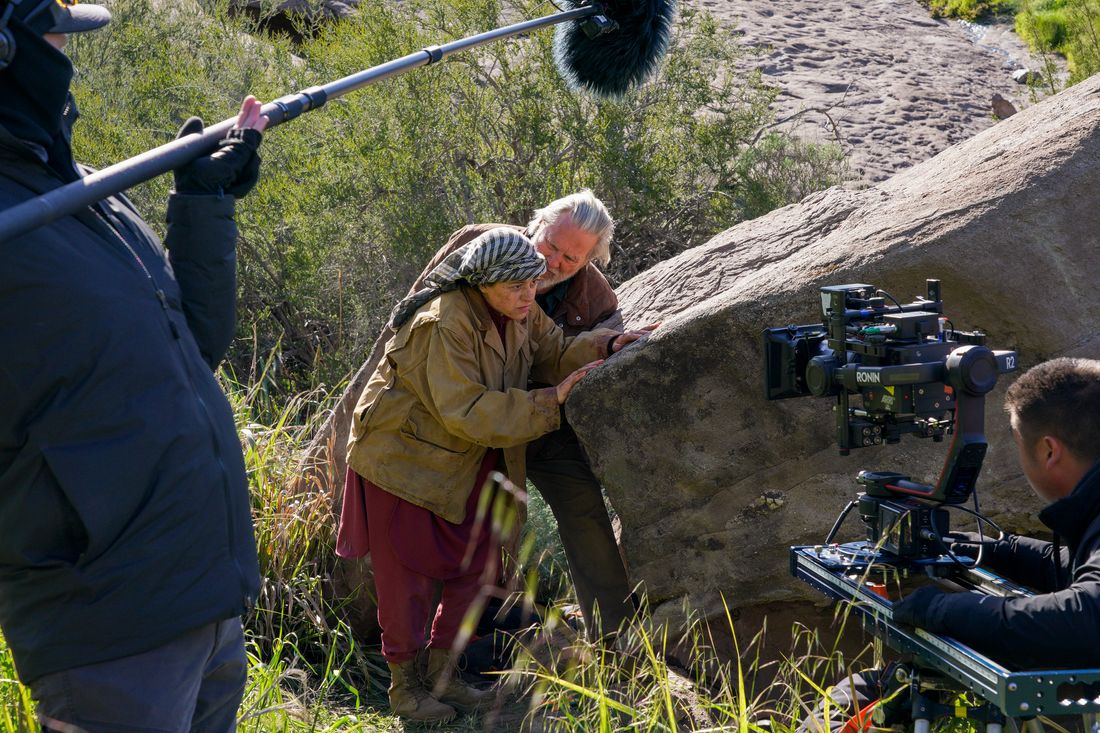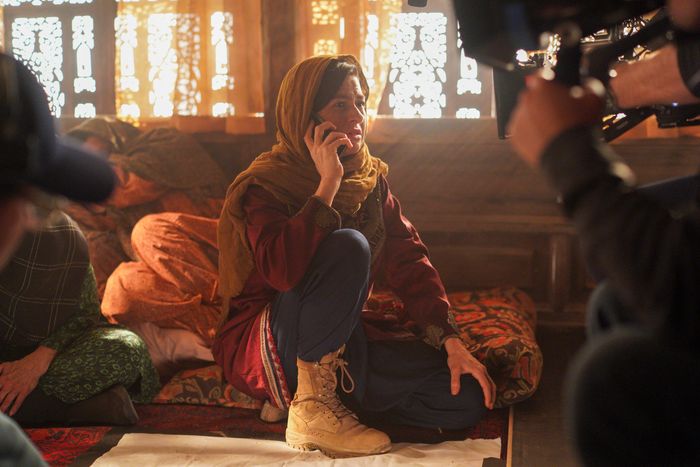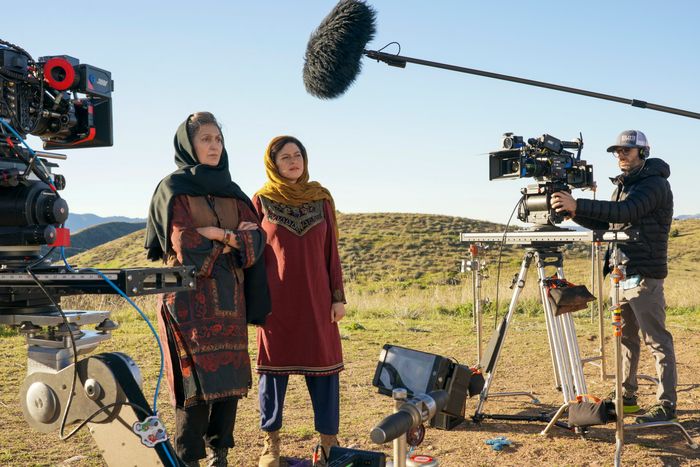
Spoilers follow for the second season of The Old Man, through finale episode “XV,” which aired on FX on Thursday, October 24.
The old men of The Old Man have spent decades calling the shots. Regardless of nationality or ethnicity, they speak a common language of geopolitical power — one that’s mostly masculine, in particular in the series’ second season, with its focus on both Taliban fighters and Russian mercenaries attacking a small Afghan village. Until, in penultimate episode “XIV,” the smoke from the battle over an invaluable mineral deposit clears to reveal a new player on the board. Alia Shawkat’s Parwana Hamzad, wearing a headscarf and a determined gaze, has ascended.
“You don’t expect her to be a big part of the show, at least the way it starts out. She becomes a much bigger player in the storytelling, which I think is very on brand for The Old Man,” Shawkat says of Parwana’s two-season arc, which ends with her being more influential than her two American father figures, Dan Chase (Jeff Bridges) and Harold Harper (John Lithgow). “That’s really what drew me to it from the very beginning, that they were like, ‘We want these stories of this American hero, but what did he actually do? And what’s the aftermath?’ On a kind of collective consciousness level, it’s like the old man is dying, and a young, ideally Arab feminine is taking the place and healing what’s happened.”
Shawkat, who joins our video call wearing an Artists4Ceasefire pin, has lots of praise for the series’ nuances. As an actor, she knows the show’s unique style — all those long action takes and gloriously verbose monologues — requires an exacting level of detail that might drive her and co-stars Jeff Bridges and Amy Brenneman a little batty, but that will deliver the right amount of tension onscreen. As a biracial woman of Iraqi and American descent, she appreciates the inner lives the show created for her character’s biological father, Faraz (Navid Negahban), and aunt Khadija (Jacqueline Antaramian), Afghan leaders who protect their village’s women and children from the country’s religious extremists. And in both capacities, she’s looking forward to a potential third season of The Old Man (FX has not yet announced a renewal), in which Parwana can throw her weight around to save Harper from his captors and hold Chase accountable for separating her from her birth family.
“She loves him, but she also hasn’t forgiven him for what he has done and what she’s learned,” Shawkat says of Parwana’s emotional state during the season’s final diner confrontation between herself and Chase. “Now she knows this truth, and she’s just like, ‘I need you to do this for me. It’s the least you could fucking do.’”
I was very jazzed about Parwana being in charge of the mineral deposit. It is such a fascinating journey for her to go from being a U.S. government agent to spending time with her Afghan family and realizing how different they are from what her American father figures said. How did you react to that ending?
I was very into it. Going all the way back to when I was cast in the role, my questions were like, “What happens to this girl?” When you do a TV show, you never know how long it’s going to go. I was like, “What is this real arc? She’s protecting her father, but at what cost to her? What is she doing in the long run for herself?” And [showrunner and co-creator] Jon Steinberg painted that picture for me early on where he was like, “Ultimately, she becomes him. She takes his role,” but in a way that she’s paying the price. She’s healing old wounds. She’s like, “I had to lose a part of myself because of what you did. This is the aftermath of what happens.” And it’s kind of like righting the wrongs on the deepest level, a cultural level, a paternal level. She has these three father figures in her life, and the one that she knows the least is her actual father. And there’s the pain of being faced with who you really are and not being able to connect to it, and feeling like you lost all this time. It’s a really beautiful arc, because she’s now standing in her power in the deepest way, even though she had to sacrifice a lot to get there.
She needs Dan’s capacity for violence to overcome the Russian mercenaries, but I think she also displays elements of each parental figure. She is a leader like Hamzad is. I saw some of her mother’s ability to manipulate. There’s Harper’s sense of right and wrong. Am I being too sentimental in thinking that every parent affected her?
No, I think you’re right. She’s learning these qualities in herself as they arise. Sometimes you surprise yourself. She’s definitely not a perfect person. I mean, with the Russian mercenary — we humanize him. He had a family and kids, and she’s like, “Yeah, but you gotta go.” And it’s awful. Even the actor who plays him, I loved him so much, and I was like, It’s so awful what she’s gonna do to him. But it is that thing about right and wrong, which is an interesting theme about this show — it’s always changing. And especially in war and in higher-up positions, people who are actually sending others out there to war and saying, “No, we need to kill these people,” they have to have such a clear idea in their mind of who deserves this and who doesn’t. And it’s a really upsetting thing, because me personally, as an actor, I’m like, Nobody deserves any of this.
You’re basically playing three characters. In season one, you’re Dan’s daughter Emily and Harper’s surrogate daughter Angela, and then season two adds Parwana into the mix. Did you map them each physically, how they would move, how they act?
It was a lot more intuitive, because the show took almost three years to finally shoot. We started shooting the first season in 2020, and I was in such different spaces when I was making it. When you see Angela in the first season, there’s a lightness and this idea of control about her. Everything’s kind of quick. Emily has a younger energy to her, because it’s all through this identity with her first father, and it only exists on the phone. She’s at a playground talking to him, and her voice is a little smaller. It’s hard to hide a voice on the phone, so it took a long time to be like, How do we change her voice without me doing some weird accent?
Then with Parwana, there’s a crack. She’s emotional and angry, and all these feelings that she’s never really allowed herself to be. And she’s messy, you know? As an FBI agent, you’re trained to not show emotions and play on other people’s emotions, which she ends up doing to get what she needs. But when she’s talking to her aunt and her real father, she’s not able to hide that these different people inside her are clashing for the first time. I was just trusting that rhythm, of her being mature at the beginning, to feeling kind of infantile, to being all over the place and having no ground to stand on.
In a prior interview, you said, “I’m not the kind of actor where I completely transform into a role. It’s very much myself that I bring into it, usually different stages of my life. There’s lots of pieces of me.” Was there one “piece” of you that felt most useful for your character’s journey this season?
I was pregnant throughout the first four episodes. I was going through a huge change in my life, and I leaned into this identity shift I was having where I was like, I’m still the same. I’m just pregnant. But my life’s about to change. When I was working, I didn’t allow myself to go there — I’m pregnant, whatever — but in a way, I used it, because the energy behind the character was, there’s a transformation happening, and I’m not even aware what it is. Something’s happening to me, something big, and the beginning of a new life in my personal life and this, it kind of felt the same way. By the time all the strikes happened, I had my kid. He was healthy, it was great, and then I came back. Now I’m wearing a pair of jeans and sitting at a diner, and I’m like, “I’ve been through some shit. I’ll tell you about it later, Dad. But right now I need you to help me.” [Laughs] It was great how it mirrored my journey.
Watching the show, I thought a lot about my father, who was from Iran and who had things about the past that he just didn’t talk about. You’ve talked about being biracial and interrogating “what kinds of circles of privilege I’ve had access to because of that.” To me, that statement felt so in line with what your character goes through being in Afghanistan, meeting this family she didn’t know about, confronting the American legacy in that country. Did you think about that at all?
I’m so glad that that translates. Obviously, that’s in the story, but if you don’t have that kind of background, maybe you don’t connect to it as personally, as I also did. In my personal story, my father came to the States and built a life out of having nothing. And it’s very similar, too, where I’ll ask him questions and I get two-word answers, whereas on my mom’s side, who’s from here, I’ll get a fucking essay about who’s doing the dishes. It’s a very different way of communicating about history, and it is hard because stories are how we connect to our past, and how we get to know who we really are. And this show really plays on that in a very Shakespearean way.
I feel very privileged to play a character like this because she is grappling with those two things. She was able to have the education that she had by being raised in the States, and be an FBI agent and learn Russian. If she was raised in Afghanistan, with her father being Faraz Hamzad, she probably would be trained in a different way. Now she’s able to reconnect to that part of her roots. And personally, I feel that so much in just the storytelling that I do, and especially in the projects that I’m writing, and playing characters that are acknowledging where my family is from, especially now that the Middle East is just being destroyed. It’s so morbid and upsetting. But I think it’s even more important that actors and artists from the Middle East represent voices and say, “We’re not just numbers that are being killed in these small villages. These are people who have families, and they have stories, and we have to remember these stories and tell them, and they’re as valuable as any life.” It’s upsetting when you watch this season, to be seeing what’s happening to this Afghan village and these women and children, because it’s mirroring so much of what’s happening in the world. But art reflects life in that way, I guess.
When I talked to Navid, he mentioned you two working together years before, and how you rediscovered each other as actors on set. How did you and Jacqueline work together on this relationship between two generations of women?
Jacqueline is a brilliant actress. We don’t have this kind of healing moment of “I love you,” which is also very truthful. She’s a very tough character. We would talk about the choices Jacqueline was making. She was like, “I don’t think she would show much affection to Parwana.” When they hold hands, I grab her hand at the funeral. She’s not someone who has expressed any warmth physically. And for my character, I see her and I’m like, I have to take her place. I have to do this for her. When she dies, it happens so fast, and that actually fuels Parwana to be like, I’m gonna kill these motherfuckers. I’m gonna have to get everybody out of here. I love the scenes with Jacqueline. She puts me in check so much. She’s really the wisest one of everybody, because she’s the only one not emotionally reacting. She also had to learn so much Dari, and I was always so impressed with that. She’s doing full scenes in the language.
The season ends at a diner, where you reveal that you’re alive to Dan and Zoe and that you’re now in charge of the mineral deposit. The power dynamic has really shifted in that scene.
That was actually the last scene we shot of the season. It took two days to film it. The Old Man is classic for making one simple scene be like we’re shooting a small indie film. There’s, like, 12 shots under the table. We kept joking, “How many more angles are we gonna get on this thing?” But it does work. That’s why it has this tension, because there’s all these micro shots that create this atmosphere.
We were in that diner for two days, 12 hours a day, doing the dialogue over and over and over again. It was crazy. But being with Jeff and Amy was a joy. They’re just so funny and giggling all the time. And any time one person would forget the line or hesitate, the other person knew the line; that’s how many times we did it. At the same time, it was still so fun to play, because when we were in the money angles, where we really had to play it, I’m finally giving it to him. “Yeah, I’m your daughter, but I don’t look up to you anymore the same way I did. It’s forever changed.” It really felt like we were playing with something more intense. And when the lights shine from the cars, it felt almost like it does when you watch it. There was this weight to it that felt really badass. I felt very in myself, playing that strength. I watched it with my parents last night, and my dad was like, “You’re so cool!” He was really into it.
There’s no indecision from her. She’s planned this. How did you refer to her in that moment? Is she Parwana? Are Emily and Angela gone at this point?
You have a little chair on set that says the character’s name on it, and mine always said “Angela.” And I crossed it out and wrote “Parwana.” I don’t think anyone noticed except me; I was like [nods and smiles in approval]. She might respond to either “Angela” or “Emily” as a reaction, but I think she’s like, “That’s not me anymore.” Not to compare it to trans rights, but it’s like a dead name, I think. I think she’s happy to see him. She loves him, but she also hasn’t forgiven him for what he has done and what she’s learned. Now she knows this truth, and she’s just like, “I need you to do this for me. It’s the least you could fucking do.” There is no “Come on, Dad.”
God willing, there’ll be another season. How much she allows him back in, I’m interested to see. She’s a little grizzled after what she’s had to do. She’s tired and doesn’t really have patience for them. I imagine her on her private jet afterward, having a hard drink. And Dan’s like, “Are you okay?” And she’s like, “Yeah, I don’t want to talk to you right now.”




